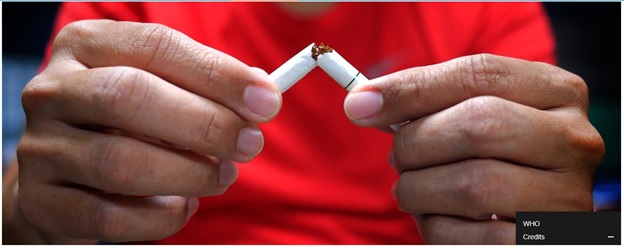World No Tobacco Day: A Perfect Handbrake for the Tobacco Industry
The last day of the month of May will see the World Health Organisation (WHO) and other health bodies come together to take a stand against the indiscriminate tobacco consumption across the globe. There is perhaps no better time to champion this cause as tobacco reportedly claims about 8 million deaths annually which is 8 times deadlier than HIV/AIDS and 5 times more lethal than Diabetes.

This year's event themed "Protecting youth from industry manipulation and preventing them from tobacco and nicotine use" focuses on empowering young people to engage in the fight against Big Tobacco. WHO emphasizes that the tobacco industry manipulates youth with different strategies, including use of youth-appealing flavours, attractive product designs, promotion claims of “harm reduction”, sponsoring celebrities/influencers and brand events, point-of-sale marketing at vending outlets frequented by children, and indirect marketing, etc.
This year also marks the 15th year since the world’s most important health treaty, the Framework Convention on Tobacco Control (FCTC), came into force. The FCTC is saddled with the implementation of principles and framework for tobacco control as well as maintain political engagement at the highest level and working collaboratively across stakeholders.
Nigeria became a party to the WHO Framework Convention on Tobacco Control on January 18, 2006 which was 10 years after Nigeria signed the FCTC. Lack of funding and conflict of interest (of protecting citizens from harmful effect of tobacco viz. a viz. the economic gains from the industry) are the major barriers that slowed the policy process . This has helped with the implementation of policies and tobacco control legislations on Smoke Free Places, Tobacco Advertising, Promotion and Sponsorship, Tobacco Packaging and Labeling, Cigarette Contents and Disclosures, Sales Restrictions, E-Cigarettes etc.
Before the WHO Framework Convention on Tobacco Control (FCTC) fully came on board in Nigeria, the statistics of tobacco consumptions among youths in the country was nothing to write home about and not much has improved since.
It was further highlighted that this menace has eaten deep into the fabrics of secondary schools across the country with the potential for the number of Nigerian smokers to rapidly increase. The prevalence of smoking experimentation from a nationally representative survey conducted among in-school Nigerian adolescents aged 13–15 years old ranged from 3.6 to 16.2% .
In response to the call by the WHO on World No Tobacco Day 2020, TNCI will be using ‘story telling’ to provide a counter-marketing campaign and empower young people to engage in the fight against Big Tobacco.
Please see links to stories submitted by our top writers in line with the overall objectives for this day.
Also, we urge you to use your individual platforms to share these stories to empower youth to stand up to Big Tobacco by dispelling its lies and refusing to use its products.
Links for further reading
- Link 1: World No Tobacco Day: Now What, Smokers? - by Kehinde Mutiu Ajibola
- Link 2: The Customer - by Eziaghighala Chinaza
- Link 3: Frenemy – by Offojebe Uzoma Linda
- Link 4: Tobacco: All Harm, No Good – by Ashiru Salam